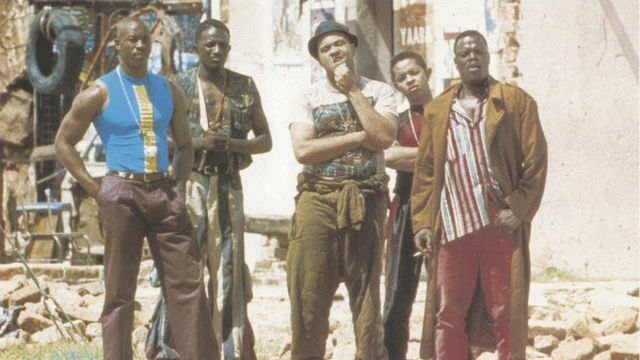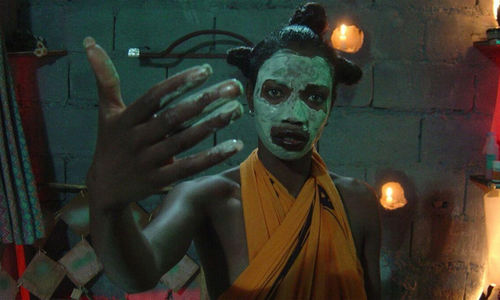
Quartier Mozart / Aristotle’s Plot
- This is a past program
Presented by the UCLA Film & Television Archive.
Part of the UCLA Film & Television Archive screening series African Futurism: The World of Jean-Pierre Bekolo. Learn more at cinema.ucla.edu.
In person: Director Jean-Pierre Bekolo
“Africans are supposed to be real and you get into a situation where the imaginary becomes the luxury of the bourgeois.”—Jean-Pierre Bekolo
Cameroonian writer-director Jean-Pierre Bekolo has never accepted the narrow expectations that the West places on African filmmakers. Indeed, he actively defies labels, mashing up genres and styles across a body of work that feels deeply grounded in the local even as it takes flight on visionary wings. An intoxicating swirl of magic and technology, folklore and genre, sensuality and politics energizes all of his work, from his debut feature Quartier Mozart (1992) to his biggest international hit The Bloodettes (2005) to the spellbinding Afrofuturist experimentation of Naked Reality (2016). In rejecting Western concepts of realism, Bekolo’s films are nevertheless deeply engaged with transforming material and political reality. It’s a stance summed up by the provocative on-screen question that concludes the futuristic action-horror fusion of The Bloodettes: “How can you watch a film like this and do nothing after?” Bekolo cut his teeth in the 1980s as an editor with Cameroon’s national television station and directing music videos before studying with film semiotician Christian Metz at the Institut National de l’Audiovisuel in Paris. Returning to Cameroon under the influence of Melvin Van Peebles, Charles Burnett, and Spike Lee and riding the optimism that suffused independent film in the 1990s to direct his first feature, Bekolo was only 25 when Quartier Mozart found international distribution after premiering at Locarno. When the possibilities of the 1990s proved as illusionary as ever, Bekolo expanded his activities into documentary and academia, engaging widely with aesthetics, political science and philosophy including a four-hour documentary on the work of Congolese intellectual V.Y. Midimbe, author of The Invention of Africa (1988). Currently the 2024 McMillan-Stewart Fellow in Distinguished Filmmaking at Harvard University, Bekolo and his work are receiving renewed attention and the Archive is pleased to have him as a guest for this two-night survey of his work.
Quartier Mozart (1992)
Domestic discord is inevitable when a police chief brings home a second wife but it's nothing compared to the delirious trouble that results when his daughter falls in love with a newcomer in town who’s actually a woman living as a man with help from a witch. Around this already intriguing central storyline, Jean-Pierre Bekolo crafts a playful, loving portrait of the quirky and complicated residents of a neighborhood in Cameroon’s capital Yaoundé in his internationally acclaimed debut feature. While the film itself blends realism and fantasy, Bekolo’s characters inhabit a multivalent cultural space where invention and reinvention seem ever possible.
DCP, color, in French with English subtitles, 80 min. Director: Jean-Pierre Bekolo. Screenwriter: Jean-Pierre Bekolo. With: Jimmy Biyong Serge Amougou Sandrine Ola'a.
Aristotle’s Plot [Le complot d'Aristote] (1996)
The first African film to screen at Sundance, Bekolo’s second feature was commissioned by the British Film Institute as part of a project to mark cinema’s centennial. The only African filmmaker invited to participate, Bekolo challenges the Institute’s motives — ”Was this an act of Christian charity or political correctness” — before launching a full tilt, satiric interrogation of the colonialist framing of Africa and African cinema. The battle, literal and figurative, over whose cinema and whose history centers around a movie theater where a band of outlaws spend endless hours consuming Western action movies until a lone champion of African film challenges their priorities.
DCP, color, in French with English subtitles, 68 min. Director: Jean-Pierre Bekolo. Screenwriter: Jean-Pierre Bekolo. With: Albee Lesotho, Seputla Sebogodi, Ken Gampu.
The UCLA Film & Television Archive is a division of UCLA Library, and presents its public programs in the Billy Wilder Theater at the Hammer, among other venues. For more information about the Archive, visit cinema.ucla.edu.
ATTENDING THIS PROGRAM?
Ticketing: Admission to Archive screenings at the Hammer is free. Your seat will be assigned to you when you pick up your ticket at the box office. Seats are assigned on a first come, first served basis, limit one per visitor. Box office opens one hour before the event. Questions should be directed to the Archive at programming@cinema.ucla.edu or 310-206-8013.
Member Benefit: Subject to availability, Hammer Members can choose their preferred seats and pick up tickets for one additional guest. Members receive priority ticketing until 15 minutes before the program. Learn more about membership.
Parking: Self-parking is available under the museum. Rates are $8 for the first three hours with museum validation, and $3 for each additional 20 minutes, with a $22 daily maximum. There is an $8 flat rate after 5 p.m. on weekdays, and all day on weekends.
Read our food, bag check, and photo policies.
Read our COVID-19 safety guidelines.



